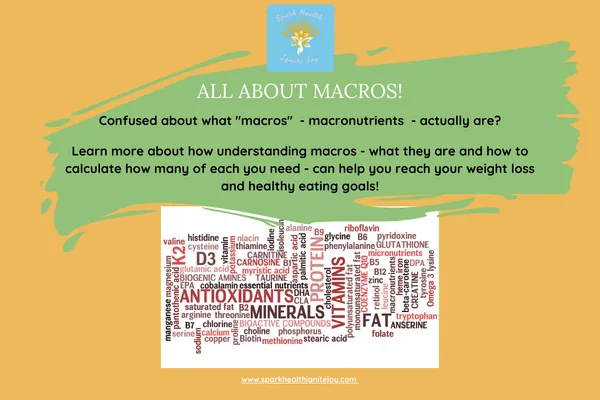Welcome to my Blog!

About the Blogger
Hi, I'm Wendy!
I'm an EXPERT in fun, joy and living life with a "you gotta put in the hard work for what you want (but still have fun doing it!) and the rewards are SO worth it" mantra for success and getting the most out of life!
I'm a CERTIFIED EXPERT in fitness, nutrition, weight loss and coaching from a habits-based, whole foods plant-based perspective that is all about GOOD HEALTH for life.
My passion is helping people truly find and live their optimal lives through making the connections between optimal health and a joyful, fulfilled life.
Through online courses and meal plan coaching, I teach strategies for good habits, good health, making things easier for yourself, and being good to yourself and others.

Macros-find your macros, calculate your macros, hit your macros....what the heck does this even mean?
Have you been hearing or seeing the words “find your macros”, “hit your macros for the day”, “macros for weight loss”, “macros for bodybuilding” etc.? Wondering what the heck that even means or if you need to “find it” or use “macros” on your health and fitness journey?
Fear not, friend. I’m going to give you the low-down on what “macros” (short for “macronutrients”) are.
First, do you NEED “macros”? Yes! Are you already getting “macros”? If you’re eating at all, YES you are.
Macronutrients are part of overall nutrition.
A good definition of nutrition is: “The process of taking in food and using it for growth, metabolism and for repair of body tissues.”
“Nutrition” consist of two main types: MACROnutrients (Protein, Carbohydrates, Fats) and MICROnutrients (vitamins, minerals). Water is also an important part of nutrition for the body.
Let’s look at macronutrients more closely so you can see how and why you need them.
CARBOHYDRATES:
Have 4 calories per gram
Important for: Carbs are essential. Not only are they the body's preferred source of immediate energy - and, in fact the only energy source for red blood cells and the brain (brain fog, anyone? if you’ve been on a “low carb” diet and not eating healthy carbs?). Carbs also store energy, and with fiber, also improve digestive health and cholesterol levels.
Carbs are the source fiber which is very important for a healthy body
Healthy carbs: vegetables, fruit, legumes (lentils, beans, peas, chickpeas), potatoes sweet potatoes and yams, grains (oatmeal, whole wheat, barley, buckwheat, plain popcorn), whole wheat bread, whole wheat pasta, brown rice, oatmeal, whole wheat cereal, bran flakes, quinoa, corn tortillas
Unhealthy carbs: sugar, sweetened beverages, pastries, cookies, cakes, white bread, white pasta, white rice, flour tortillas, most packaged cereals
Recommended daily amounts: The Dietary Guidelines for Americans recommends that carbohydrates make up 45 to 65 percent of your total daily calories. Women should get a minimum of 25 grams of fiber per day and men should get 38 grams. You get the fiber through the type of carbs you eat, so choose well!
PROTEIN:
Has 4 calories per gram
Important for: Proteins form the major structural component of muscle, as well as that of the brain, nervous system, blood, skin and hair. Protein serves as the way to transport iron, vitamins, minerals, fats and oxygen in the body.
Healthy sources of protein: lentils, chickpeas, beans, potatoes, most vegetables have some protein, dark, leafy greens (kale, chard, spinach), Ezekial bread, quinoa, hemp seeds, tempeh, tofu, edamame, bulgar, barley, oats, brown rice, wild rice, flax seeds, chia sees, buckwheat, fish, seafood, lean meats
Less healthy sources of protein: red meat, dairy products
Recommended daily amounts: For most physically active people sufficient protein amounts to meet the body's needs, even when exercising, are between 10-35% of daily energy (calorie) intake. The average person requires 0.4-0.5 grams of protein per pound of body weight ( 0.8-1.0 grams per kilogram of body weight). Can too much protein be harmful? Yes. People that eat very high protein diets have a higher risk of kidney stones. Also a high protein diet that contains lots of red meat and higher amounts of saturated fat might lead to a higher risk of heart disease and colon cancer, while another high protein diet rich in plant-based proteins may not carry similar risks. Protein consumption beyond recommended amounts is unlikely to result in further muscle gains because the body has a limited capacity to use amino acids to build muscle. How much is too much? The threshold for maximum benefit is around 1.7-1.7 grams per kilogram and after that the excess will just be providing excess calories that is stored as fat.
FATS:
Have 9 calories per gram
Important for: Fats are important for absorption of nutrients, insulation, nerve transmission, and cell structure. The body needs (healthy) fats. When it comes to health it is not so much the amount of fat but the TYPE of fats we consume. Since fats are essential nutrients but also are more calorie-dense than either protein or carbs, you want to take in your fats in the form of healthy fats (ideally through whole foods, which also provide other nutrients like fiber, vitamins and minerals that oils don’t).
Healthy sources of fats: avocados, olives, nuts, seeds, chia seeds, hemp seeds, flax seeds, coconut, soybeans, tahini, peanuts, olive oil, safflower oil, sunflower oil.
Unhealthy sources of fats: commercially-baked pastries, cookies, doughnuts, muffins, cakes, pizza dough, packaged snack foods (crackers, microwave popcorn, chips), stick margarine, vegetable shortening, lard, fried foods (french fries, fried chicken, chicken nuggets, breaded fish), any food product containing hydrogenated or partially hydrogenated vegetable oil, even if it claims to be “trans fat-free”, red meat (beef, lamb, pork), chicken skin, whole-fat dairy products (milk, cream, cheese), butter, ice cream, palm oil
Recommended daily amounts: It is recommended to get 20-35% of your daily calories with fat. The American Heart Association recommends no more than 5% to 6% of daily calories from saturated fat.
SO: when you hear and see “find/determine your macros” all over the place these days, what it really means is finding the ideal amount of calories for your body so you are taking in the right amount of each kind of macronutrient while not taking in an excess of calories which can lead to weight gain. If your goal is to lose weight, for example, could you do that by eating all carbs? All fats? All protein? Technically yes IF you expended more calories in your day through exercise (and just the body actually living and breathing) than you take into your body with food. Eating a wider variety of healthy, whole foods and having the right balance of “macros” is important so you can get all the nutrients you need for good health and disease prevention.The important thing to remember is that not only do you need macronutrients, you need the micronutrients that can be found in adequate amounts if you eat real, whole foods where micros are found, and minimize the refined and processed foods that either have no nutrients, few nutrients or unnatural sources of a few nutrients.
There is so much more to nutrition than this and I have just given you a basic outline of macronutrients here. For a healthy weight, good health, disease prevention and the energy you want, the key is to focus on eating a wide variety of healthy foods so you can get all the nutrients - macro and micro - that your body requires for optimal health.
Nutrition Spark!: If you eat a healthy, balanced diet and aim for the daily recommended amounts of macronutrients for your body weight and your goals you will have energy and good health! If you eat a wide variety of whole-foods and avoid processed and refined foods you will meet your nutritional needs for both macro- and micro-nutrients through food and in most cases you will not need supplements.

For much more information on macronutrients, nutritional principles, healthy eating, meal prep and weight management through nutrition, check out my courses HERE.
Sign up for my Spark Health, Ignite Joy newsletter HERE.



Facebook
Instagram
X
LinkedIn
Pinterest